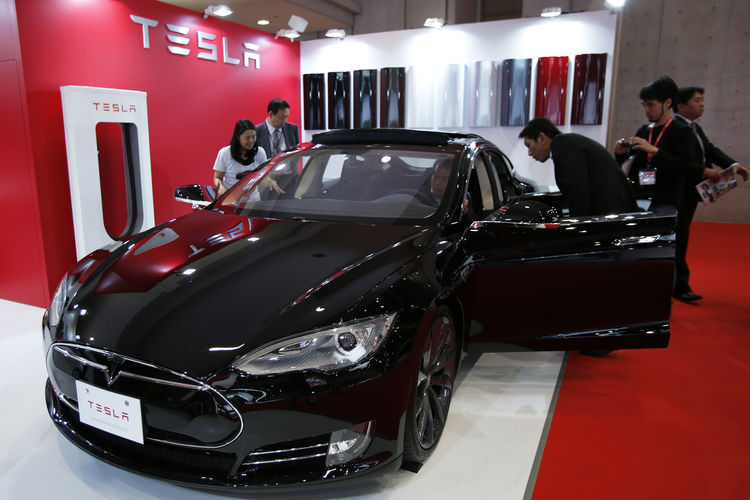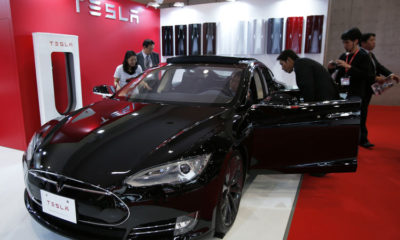- Tesla CEO Musk Drops Pursuit of $72 Billion Take-private Deal
Tesla Inc (TSLA.O) CEO Elon Musk said late on Friday he would heed shareholder concerns and no longer pursue a $72 billion deal to take his U.S. electric car maker private, abandoning an idea that had stunned investors and drawn regulatory scrutiny.
The decision leaves Tesla as a publicly listed company but raises new questions about its future. Its shares have been trading below their Aug. 7 levels, when Musk announced on Twitter he was considering taking Tesla private for $420 per share, as investors wondered what the long-shot bid meant for Musk’s ability to steer the company to profitability.
The move also leaves Musk and Tesla having to fend off a series of investor lawsuits and a U.S. Securities and Exchange Commission investigation into the factual accuracy of Musk’s tweet that funding for the deal was “secured”.
Musk said on Friday that his belief that there is more than enough funding to take the company private was reinforced during the process. He attributed his decision to abandon the bid to feedback he received from shareholders and on the effort proving to be more time-consuming and distracting than he anticipated.
“Although the majority of shareholders I spoke to said they would remain with Tesla if we went private, the sentiment, in a nutshell, was ‘please don’t do this’,” Musk wrote in a blog post on Friday.
Musk, who owns about a fifth of Tesla, had said earlier this month that he envisioned taking the company private without using the standard method of a leveraged buyout, whereby all the other shareholders would cash out and the deal would be funded primarily with new debt.
Instead, two-thirds of company shareholders, according to his estimate, would have chosen an option of “rolling” their stakes and continuing to be investors in a private company, rather than cashing out. This would significantly reduce the amount of money needed for the deal and avoid further burdening Tesla, which has a debt pile of $11 billion and negative cash flow.
However, Musk said on Friday that a number of institutional shareholders explained to him that they have internal compliance issues that limit how much they can invest in a private company. He added that there is no proven path for most retail investors to own shares were Tesla to go private.
Musk had previously said that Saudi Arabia’s PIF, which became a Tesla shareholder earlier this year with a stake of just under 5 percent, could help him fund the cash portion of the deal, though sources close to the sovereign wealth fund had played down that prospect. PIF is in talks to invest more than $1 billion in aspiring Tesla rival Lucid Motors Inc, Reuters reported last Sunday.
Six members of Tesla’s board of directors said in a separate statement that they were informed on Thursday that Musk was abandoning his take-private bid. The board then disbanded a special committee of three directors it had set up to evaluate any offer that Musk submitted.
“We fully support Elon as he continues to lead the company moving forward,” said the board statement.
FOCUS ON MODEL 3
One of Tesla’s biggest challenges now is ramping up production of its latest vehicle, the Model 3. Multiple “bottlenecks” at its Fremont factory and battery factory outside Reno, Nevada have delayed volume production.
Tesla now aims to consistently build 5,000 Model 3s per week, a target it says it has managed “multiple times” since first achieving it one week in June.
Musk has said repeatedly since April that Tesla has no need to raise new capital, and has promised to be profitable and cash-flow positive in the third and fourth quarters. But analysts expect Tesla will require billions of dollars more over the next several years to fund ambitious expansion plans and to develop new electric premium vehicles to take on German rivals.
Capital-intensive projects in the pipeline include a new Roadster, a Model Y SUV, and an electric big-rig. The company’s Gigafactory is only partially complete, and Musk has said a European plant location will likely be announced this year. Financing for a new China plant will come from local debt, he said.
The struggle to launch the Model 3 coincided with an escalating war between Musk and short sellers betting that Tesla’s high-priced shares were bound to fall as the company burned off its cash reserves.
In explaining one of his reasons to take Tesla private, Musk cited short sellers earlier this month, stating that “being public means that there are large numbers of people who have the incentive to attack the company.”
Citigroup Inc (C.N) analysts wrote in a research note earlier this month that, if a go-private transaction is looking less likely, “it would be wise for Tesla to at least try to raise significant new equity capital sooner rather than later,” so it can inspire investor confidence.



 Forex3 weeks ago
Forex3 weeks ago




 Naira2 weeks ago
Naira2 weeks ago
 Billionaire Watch2 weeks ago
Billionaire Watch2 weeks ago




 Naira2 weeks ago
Naira2 weeks ago




 Naira2 weeks ago
Naira2 weeks ago




 Naira1 week ago
Naira1 week ago




 Naira4 weeks ago
Naira4 weeks ago




 Naira3 weeks ago
Naira3 weeks ago
















